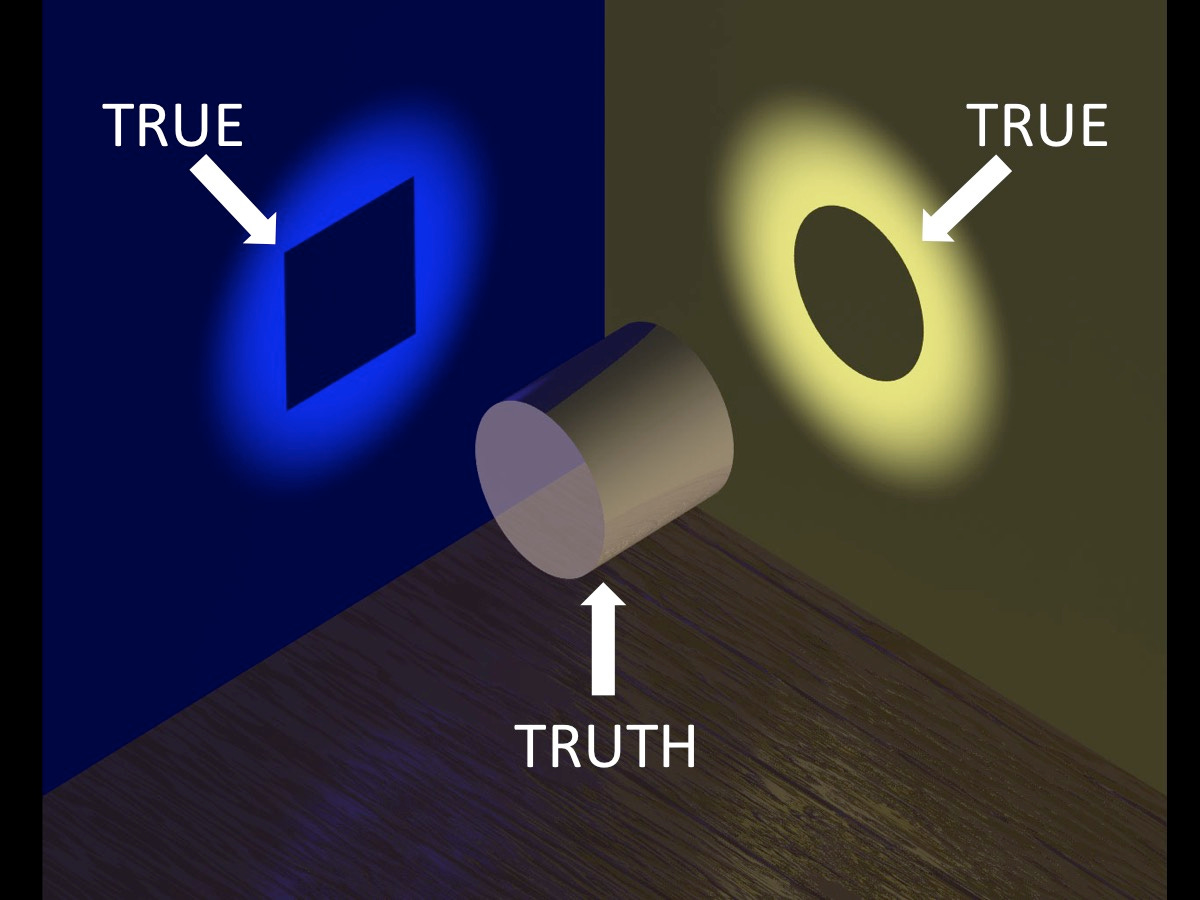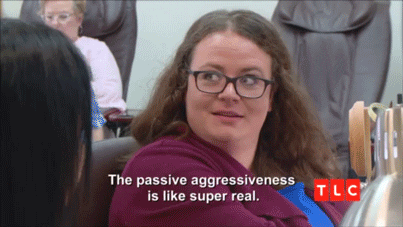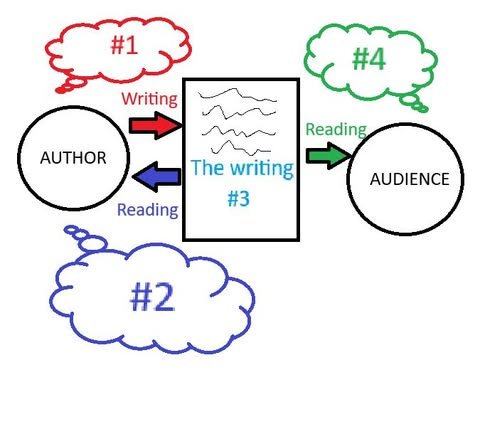On Writing: A Needless Text Debate
In which Ian and Eric get into a petty text argument over philosophical minutia.

A few days ago Eric Falden posted this note , recreated below:
Why is it important to work on the technical craft of writing?
Because these are four completely distinct things:
What you intended to write
What you think you wrote
What you actually wrote
How the audience reads what you wrote
The craft of writing consists in uniting all four.
In good writing, all four match.
Ian Dunmore saw that note, and texted Eric.
What follows is a reprinting of our text conversation? debate? incomprehensible yelling. Memes and images are included. Wherever possible, we have included the emoji “reactions” to one another’s messages. (We have made some slight changes for clarity.)
Enjoy. Because we sure didn’t.
Ian: We may have argued about this before, but I’m not convinced #3 [i.e. “What you actually wrote”] exists. I think it’s just dissociated across the other categories.
Eric: The existence of typos suggests otherwise
Ian: Why wouldn’t typos belong in #4? [i.e. how the audience reads what you wrote]
Eric: Audience can miss typos. Also multiple readers can understand different things. Satire is a great example. Tons of people miss satire.
Ian: Sure, but “tons of people” and “multiple readers” is still “audience.” Just because the audience is complex and nonuniform doesn’t mean there’s an objective “actually wrote” out there.
I get that it’s a bit of a “tree falls in the woods” problem. If nobody sees the typo, is there a typo? And I think this is where we’ve digressed phenomenologically.
Eric: Long before historians deciphered hieroglyphics, the hieroglyphs were still carved on the rock. The authors are dead and we cannot know the extent to which the authors’ intent—limited by vocabulary and language and physical space on the rock—corresponded to the precise glyphs on the rock, let alone our interpretations of them.
But the words are still on the rock.
Ian: Totally, but we don’t know what they say and we never will! You can talk about a physical book, but the meaning of the words therein is an entirely different beast because it requires a subjective observer. There are no subjective observers left who understand the meaning of Vinca symbols the way Neolithic Europeans did.
“The words on the rock” are pragmatically not the same as “the meaning of the words on the rock.”
Eric: Yeah but that’s my whole [REDACTED] point. The author’s intention and what is understood are completely different, but both could differ IN PART because of nuances (or even physical errors) within the medium.
Ian: Say you go searching for “what was actually written.” You find it, allegedly.
Wait, are you the writer, or an audience? There are no other options.
Even if we argue that #3 exists, it’s inaccessible, because you still need an author (who is either writer or audience) to be the guarantor of meaning. There is no other way to find it. Rocks don’t read, and God isn’t telling.
Eric sent the following image:
Eric: This is what we’re dealing with. The floating 3D object is what I mean by #3. “What you actually wrote.”
Also: all four of my things CAN align and match. Which is called effective communication.
Ian: I get this, but my whole point is that a story is not a physical shape out there. It doesn’t exist on its own. It emerges from one’s engagement with it.
Eric: Yes, that is #4 [How the audience reads what you wrote] in action. And it emerges from one’s engagement with …
… ink on a page.
Ian: Ink on a page is not meaningful without someone coming along and … reading it. If you can’t read, i.e. imbue meaning, then it’s just ink. It’s inert. It has nothing to say.
Author writes story, intending X. Audience reads and understands Y. Death of the author blah blah blah but who’s right? Well, why not just consult the 3D object that #3 alleges?
Because its somewhere in the other categories. It’s not apart from them.
I agree you can speak of #3 in abstraction. But it doesn’t exist on its own. It’s not a solid object you can find and compare against whatever you came up with to find the real thing.
Eric: I’m certain we’re talking past each other. #3 is largely the physical object. It exists APART from interpretation. Writing is about creating and sometimes that includes the physical act of writing something. Like hieroglyphs. Any meaning derived therefrom is limited by the object.
Which is why—to communicate—you must reckon with the fact that that object does not automatically contain your INTENDED meaning.
When you read and interpret a text you are doing exactly what you said: “trying to consult the 3D object.”
Ian: So bigger subject, but yes the entire point of text is to constrain – to take it from meaning anything to meaning SOMEthing. Some messages/themes will be more definitive than others.
Some texts are more definitive in their meanings, others are more broad and valenced. I’m just skeptical amid the other categories that 3 exists in any meaningful way without ending up exactly the same as one of the other three.
Eric: I think I understand what you’re saying (ironic). I think you understand what I’m saying (ironic).
I’d follow up with
I’m trying to tell people to pay attention to the craft of their writing because—even just in the realm of grammar—intent & product can differ greatly. And to do that I’m trying to get as granular as possible on all the moments of translation.
I’m gonna go back to typos. I’ve seen typos in Terry Pratchett books. As a reader I can choose to tune them out, I can infer meaning in spite of them, I can infer authorial intent, etc etc. but my doing that and all those things I infer are NOT the same as the ACTUAL extant words on the page as they are written on the page, created as an indirect result of the author’s intent to communicate a thing.
You can say that typo has no meaning and like yeah sure. But it does not follow that that writing does not exist.
I remember a time I wrote about “scourging” something from existence and my editor and I went back and forth a bunch about what I meant. Then she asked “oh, did you mean ‘scour’?” And I was like “oh yes, that’s the word I meant.”
Because what I meant was not aligning with what was on the page. Even when my editor figured out what I meant (and communication was thus achieved) that meaning was not reflected on the page until fixes were made.
Ian: I get it. I’d never say writing doesn’t exist. I would say it exists differently than a wooden cylinder, but more importantly that writing exists differently than a piece of paper that has been written on.
I’m also now rethinking my stance on the basis that when one sets out to understand a work, one often assumes the existence of a #3. Whether that assumption is founded or simply practical is another question.
Eric: On your first graf: the fact that writing “exists differently than a piece of paper which has been written on” is exactly my point.
Sounds a lot like “#3 is distinct”
Ian: [replying to Eric’s ‘scourge/scour’ anecdote] … and I know I’m absolutely wailing1 on this horse, but every standpoint mentioned in this example occurs in 1, 2, and 4. 3 doesn’t occur.
Eric: Three is the [REDACTED] document
I meant scour, my audience eventually understood that I meant scour, the page [REDACTED] said SCOURGE because the written words are not magically imbued with my meaning. My intent does not change the matter itself to make the page say what I wanted the page to say.
I don’t understand how we’re not agreeing. I think we’re agreeing lolol
Ian: Gaaaaaa but you’re baiting and switching an interpretation of the document with the physical document itself!
Eric: The interpretation DEPENDS upon the physics of the document itself!!
Writing is a physical medium!
Just like speech!
Ian: Depends is not the same as tantamount to.
Speech is the vector by which we convey meaning. The meaning is distinct.
Eric: I know! I’m not saying it is!
If one depends on the other then they are separate things!
Just like how the thing you SAY is different from the intended meaning!
Ian:
Ian: Hokay, here’s this:
By #3, you mean the meaning of the text as properly understood given what is literally written therein.
Did I get it?
Eric: By #3 I mean whatever physical medium is created as a result of the author’s intent to communicate meaning.
Here:
Ian: Okay.
Can we agree that apart from the author this medium has no meaning on its own without the engagement of a conscious observer?
Eric: Yes. Like Linear A.
Ian: Okay.
Just to make sure, if #3 is the resultant physical medium sans engagement,
And since it definitively excludes both author and audience engagement,
Then it bears no interpretive impression in the vacuum in which we’ve placed it. It may have the POTENTIAL for that, but it doesn’t have that in its currently defined #3 state.
Eric: Sure.
Ian: But because it’s in this raw, potential form, then it won’t yield meaning without an observer. True?
Eric: Sure.
Ian: Lastly, are there any other possible observers who are not either authors or audiences?
Eric: Not unless we get weird with those definitions. (Also the author can be an audience themselves, as they judge their own writing). Observer = audience I’d say.
So no. No possible observers who are not either authors or audiences.
For clarity I would count as an “audience” someone who could see the thing, possibly even recognizing it as writing, but fail to grasp any meaning (eg me with Linear A or Russian or Korean, my [barely-four-year-old] son with any book).
Ian: Okay. In that case…
If 3 is the “raw form” sans observers who might come along and derive or interpret meaning,
And the only observers are authors or audiences put broadly,
Then ALL readings of the text – ie interpretations, all meaning-based, “what it’s saying is” claims – will either fall in 2 or 4.
Eric: Sure.
I don’t think I have disputed that.
But you—if I followed you—disputed the existence of that raw form.
The ability of an author to say “perhaps I’m not being clear, let me rephrase” presupposes that their meaning might fail to appear in the raw form of the thing.
The ability of an audience to recognize that their interpretation of a text MAY BE WRONG presupposes the existence of some raw form from which they derive meaning.
Ian: Got it. I was saying that the raw form bears no meaning on its own, so including it among the others (the others all being meaning buckets) is a category error.
Eric: Yeah I’m not trying to parse all the meanings. I’m trying to show the workflow of how meaning may (or may not) go from your mind to another’s, through the medium of writing.
That’s why I’m like “I don’t think we disagree!!”
Ian: Yeah I just see people frequently speak of a “real meaning” floating out there possibly independent of any artist or audience. I was also thinking of the categories of literary interpretation that usually go “authorial intent, the text itself, and audience interpretation.” They speak of “the text itself” as if it can be accessed like the solution at the back of a riddle book. I submit it cannot, and that’s what I was responding to.
Eric: Thinking more about this: the problem arises that people (of all kinds) assume that because there’s no “One True Meaning” of a text then all possible interpretations of that text are equally valid.
However, that does not follow.
Ergo, LOTR has no One True Meaning that can be fully understood and grasped. But it is invalid to say that Frodo and Sam were lovers.
Ian: Yes, and I did touch on this earlier: just because a work can hold a manifold of meanings doesn’t mean those meanings are equal. That’s why heuristics sit above definite meanings.
The moment something admits multiple meanings it gets the label “subjective” and it’s shipped off to another category.
I have many friends who I can’t really discuss art with because either it’s “subjective” so anything goes, or someone looks up what Wikipedia says and tries to invalidate every other possible vein of symbolism or meaning (ie what I thought you meant by #3).
How were we agreeing that whole time?
Eric: Oh I know this! ....
Because these are four completely distinct things:
What you intend to write
What you think you wrote
What you actually wrote
How the audience reads what you wrote
Ian:
Did the argument end there?
No.
But through this adversity did Eric and Ian’s friendship and appreciation for one another deepen?
… Also no.
But as the philosophers say, it’s not about the argument, it’s about the dank memes you share along the way.
Fin.
Bridget pointed out in the comments that this is actually incorrect, and the actual verb is “whaling on.” I have left the original for accuracy’s sake, and because, as she also pointed out, picturing me howling on top of a horse is also funny.















This thread was such a trip at the time, but it was a blast trying to throw it all together into a post. Good fun.
Wait, did you understand that? Did I? How will I ever know? What will future archeologists make of our meaningless scribbles? Oh no.
I still have to get into the weeds here a bit but I think #3 became the issue because Eric's reflex is what I think is either "positivism" or "realism" (both Positivism and Realism agree there is an objective reality, a positivist says it can be measured and accessed, a realist says it doesn't have to be measured or accessed). Ian seems like his reflex is "relativism" or "pragmatism"--that there is no objective reality outside of an observer to perceive it.
So yall thought you were arguing about writing, but really it's two mutually exclusive philosophical worldviews.
Positivism suggests that #3 has some objective quality, once the words depart from the writer, they are their own thing, and #4 is the perception component. #1 and #2 are interior to the author, #3 is the separation of the work from the author, and #4 is the reception by an audience.
Relativism would argue--and have some strong pragmatic ground for arguing--that #3 doesn't exist without #4, the audience. If everyone in the world reads a string of letters one way, how could it have an objective quality independent of that? How could we know?
This is an argument as old as time and yall are hashing the latest iteration of it.
I see you got to a point where you say you agree, but I haven't followed the argument all the way through yet, I just recognized the philosophical terms for your POV's and wanted to share. Another comment to come!